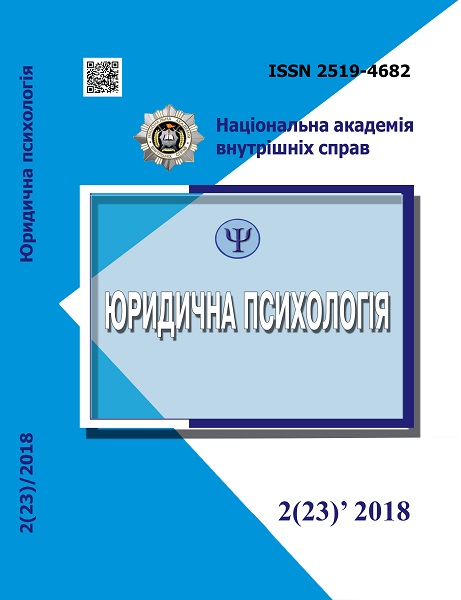Theoretical and Methodological Approaches to the Study of Corruption as a Psychological Phenomenon
Abstract
The article presents a generalized analysis of the existing theoretical and methodological approaches to the study of corruption in psychological science. Analyzed critically foreign experience of scientific research on the phenomenon of corruption in the space of psychology. The main epistemological problems of the study of the psychology of corruption are highlighted. These include the definition of the subject matter, principles and empirical methods. Possible solutions to these problems are outlined. It has been reported that it is advisable to choose the subject of the research as a category "subject". It is argued that the initial provisions of the analysis of this problem should be the basic methodological principles of domestic and foreign psychology: the principle of determinism, system, unity of consciousness and activity, development, historicism. The theoretical analysis of the concept of "corrupt behavior" should be carried out on the basis of the basic concepts of leading psychological schools: psychoanalytic, cognitive, behavioral, humanistic, cross-cultural psychology, paradigm of dialectical psychology, psychological theory of activity, concept of social behavior, theory of social attitudes of personality, social and psychological group theories and the like. They allow you to define a specific subject of research and its conceptual apparatus. The generalization of the available scientific studies of the theoretical and methodological foundations of the analysis of corruption as a psychological phenomenon suggests the following: today the theoretical and methodological foundations of the study of the psychology of corruption are in an active stage of development. They do not have a permanent, generally accepted form in the scientific community; existing approaches to the definition of the subject of the study of the psychology of corruption in the foreign space are centered around the category of "personality". Separate features of "corruption-related personality" are highlighted. This significantly limits the subject area of this problem; the lack of development of the theoretical and methodological foundations of the analysis of corruption as a psychological phenomenon leads to the locality and superficiality of the applied empirical research.
Downloads
Abstract views: 463 PDF Downloads: 277
- Authors reserve the right to authorship of their own work and transfer to the magazine the right of the first publication of this work under the terms of the Creative Commons Attribution License, which allows other persons to freely distribute published work with mandatory reference to authors of the original work and the first publication of an article in this magazine.
- Authors have the right to enter into separate additional agreements on non-exclusive dissemination of the work in the form in which it was published in the journal (for example, to post an article in the institution's repository or to publish as part of a monograph), provided that the link to the first publication of the work in this journal is maintained.
- The journal's policy allows and encourages the posting of articles by authors on the Internet (for example, in electronic storehouses of institutions or on personal websites), both before the submission of this manuscript to the editorial office and during its editorial processing, as this contributes to the creation of a productive scientific discussion and positively affects the efficiency and dynamics of citing the published work.




